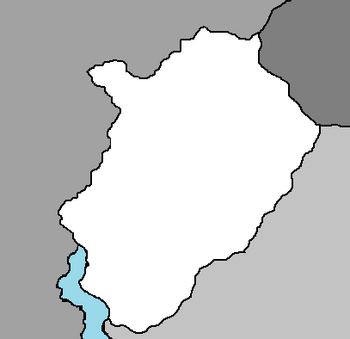West Chanchajilla
People's Republic of Chanchajilla | |
|---|---|
|
Flag | |
 | |
| Capital | Ivora |
| Recognised national languages | English, French |
| Government | Federal presidential constitutional republic |
• President | Frederick Armbar |
| Establishment | |
• Unification of Chanchajilla | 1450 |
• Chanchajilla breaks apart | 1932 |
• Republic of Chanchajilla | 1951 |
| Population | |
• 2020 estimate | 16,300,000 |
| Currency | Chancu Dimo |
| Date format | mm-dd-yyyy |
West Chanchajilla, or as it is less commonly referred to as the People's Republic of Chanchajilla is a nation located on the continent of Euronia in the Coalition of Crown Albatross. It is bordered by Gladysynthia, Paraboca, and East Chanchajilla.. The west and east had been unified as Greater Chanchajilla from their respective kingdoms since 1450, although a brutal occupation and resulting violent Parabocan War eventually eroded the social and governmental states of the nation. The separation of Chanchajilla and the ensuing Chanchajillan Civil War in 1932-44 resulted in two separate nations; east and west. West Chanchajilla established a military regime adopted many socialist economic policies, which cut it off from much of the world, while East Chanchajilla, which remained a capitalist-centered economy with more political freedoms than their neighbors to the west, gained significant aid from Zamastan, who provided packages that built their military, infrastructure, and economics.
Oil was discovered in the early 20th century. Previously, the country was an underdeveloped exporter of agricultural commodities such as coffee and cocoa, but oil quickly came to dominate exports and government revenues. The 1980s oil glut led to an external debt crisis and a long-running economic crisis. Inflation peaked at 100% in 1996 and poverty rates rose to 66% in the late 90's. The Treviso Nuclear Crisis in 1992 is considered to be the worst man-made disaster in history, and led to heavy international restrictions on West Chanchajilla. The regime under Parish White established populist social welfare policies that initially boosted the nation's economy and increased social spending, temporarily reducing economic inequality and poverty in the early years of the regime.
In 2005, Parish White died, and was succeeded by his protege, Frederick Armbar. Armbar continued the populist policies of White, but with disastrous results. The nation's economy collapsed because of their excesses—including a uniquely extreme fossil fuel subsidy—and are widely blamed for destabilizing the nation's economy. The destabilized economy led to a crisis in West Chanchajilla, resulting in hyperinflation, an economic depression, shortages of basic goods and drastic increases in unemployment, poverty, disease, child mortality, malnutrition and crime. These factors have precipitated the West Chanchajillan migrant crisis where more than two million people have fled the country, mostly to neighboring East Chanchajilla and Zamastan. East and West have also had multiple violent and sporadic conflicts between on their border in the past century, including the South Turania Offensive. In late February 2020, thousands of protesters attempted to overthrow the Armbar dictatorship, but were crushed by government forces. Thousands of suspected collaborators were arrested and hundreds of dissidents were executed on live state-media broadcasts, leading to international condemnation.
History
Early Age
Unification of Kingdoms
Parabocan Occupation
The Parabocan War
Separation and Civil War
Military Regime
Modern Day
Geography
Politics
|
Presidents of the People's Republic of Chanchajilla | |||||
| No. | Name | Dates in office | |||
| 1 | Jakob Besterio | 1 February 1951 - 1 February 1961 | |||
| 2 | Jonathan Olivitaad | 1 February 1961 - 1 February 1971 | |||
| 3 | Parish White | 1 February 1971 - 30 June 2005 | |||
| 4 | Frederick Armbar | 30 June 2005 - Incumbent | |||

